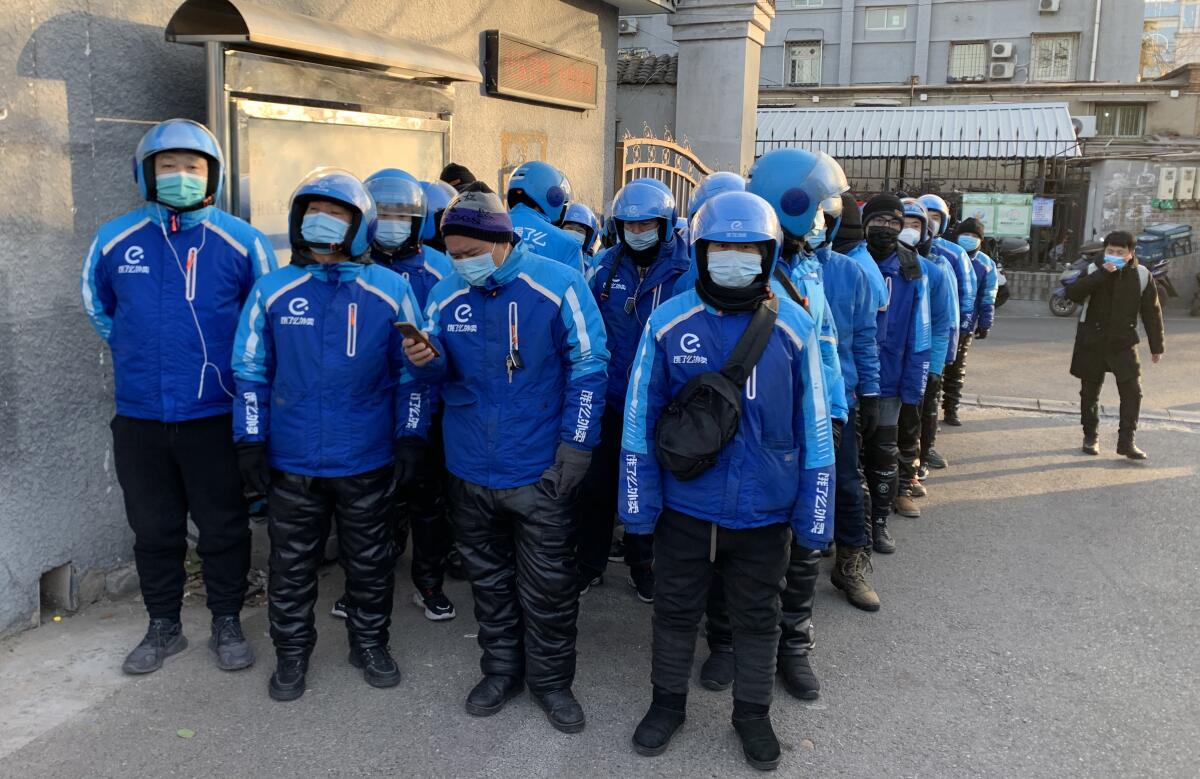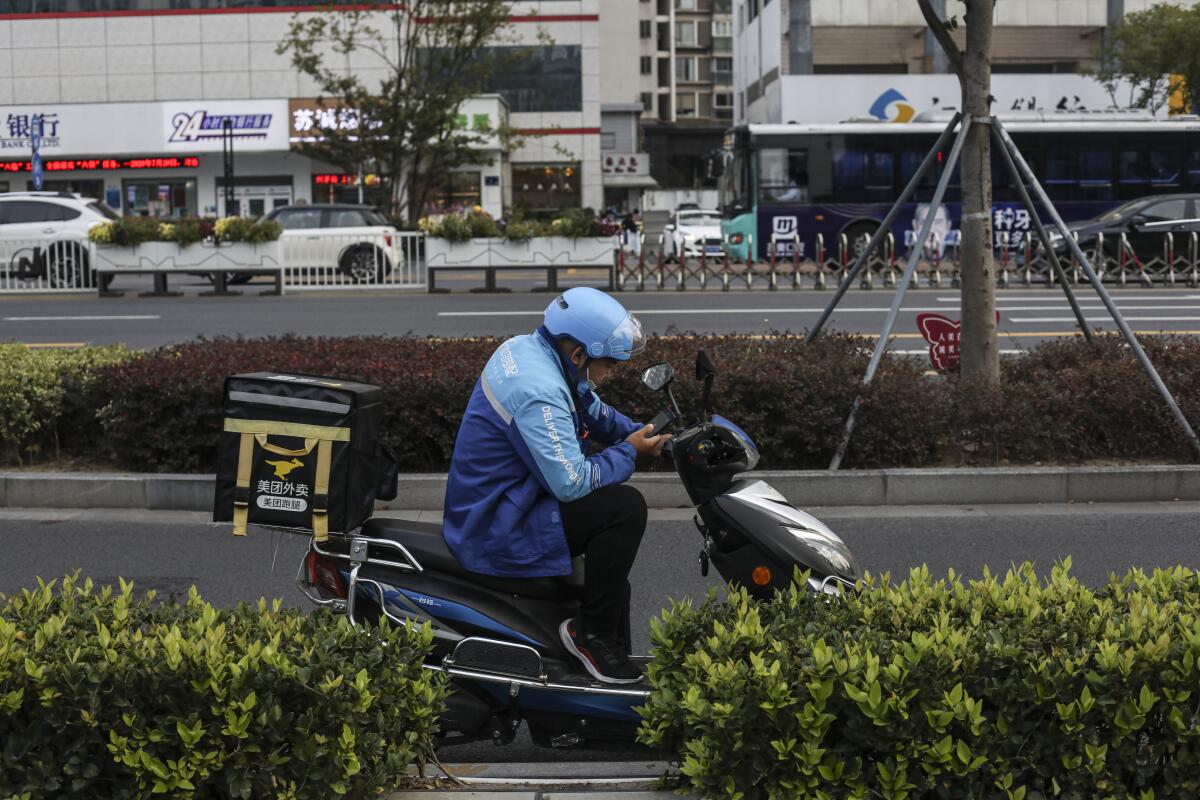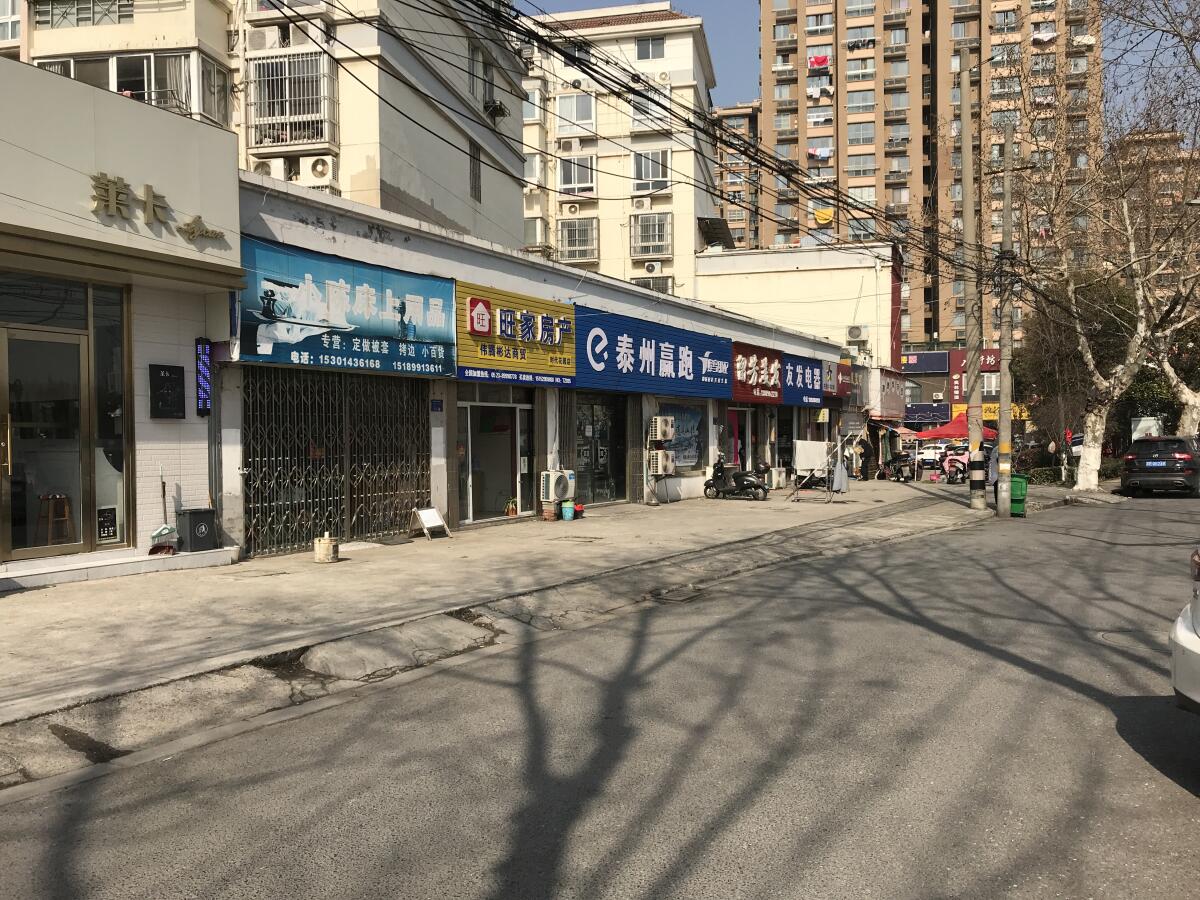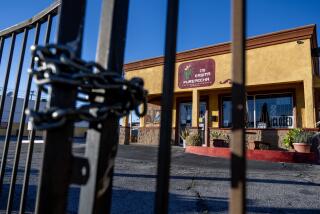Why a takeout deliveryman in China set himself on fire

TAIZHOU, China — The shop owners almost didn’t notice when the man set himself on fire.
It was lunch hour on this street of barbershops and tiny restaurants. Many were busy chopping mushrooms and ladling sour fish soup over rice, packing it up for delivery drivers who zoomed in and out on electric bikes, rushing to meet the orders beeping from their phones.
Suddenly they saw flames and smoke. Passersby shouted. People ran toward the man with extinguishers. “Go to the hospital!” they cried.
The man crawled up from the ground, shaking his head.
“I want my blood and sweat money,” he said, his body covered with white ash.
That act of protest and desperation was filmed by bystanders and went viral online. It drew attention to the harsh lives of delivery drivers at the bottom of a highly competitive gig economy. China has made an impressive recovery from the COVID-19 pandemic, but the man’s self-immolation was a reminder of how difficult the past year has been, especially for blue-collar workers, many of whom are rural migrants who have restricted access to urban social services.
Chinese delivery drivers — like their counterparts around the world — have been feted as heroes for feeding cities during pandemic lockdowns. Yet those in China are particularly vulnerable to labor abuses. Most are young men without college degrees who make less than $1 per delivery. Many work without formal contracts or sign agreements that don’t include insurance and social security.

They often work through middleman companies that manage drivers for delivery apps but sometimes withhold wages or disappear without paying. Although local labor departments sometimes help drivers negotiate, individual claims involving wage disputes and injuries are frequently dismissed. Drivers who attempt to organize and protest are easily fired, especially in pandemic times.
“For food delivery workers, protests basically disappeared,” said Aidan Chau, a researcher at China Labour Bulletin, a rights group that found a dramatic decline in protests by food delivery workers, from 57 in 2018 to 45 in 2019 to only three in 2020. “Nobody is going to strike now, because if you protest you will just be sacked and a bunch of workers will replace you instantly.”
A public discussion around delivery drivers’ rights has been growing in China even as lockdowns have been lifted. Last year, an article in the Chinese magazine People described delivery drivers as “trapped in an algorithm,” forced to follow unsafe delivery routes and unreasonable time limits decided by artificial intelligence.
Criticism following the article led some companies to add several minutes to drivers’ delivery times and to give customers an option of letting the couriers drive more slowly. But drivers’ pay cuts and lack of labor protections remain unaddressed.
The name of the man who set himself on fire was Liu Jin, one among millions of food delivery drivers for Ele.me (which means in Mandarin: “Are you hungry?”), an online takeout platform owned by Chinese tech giant Alibaba. The migrant worker, in his late 40s, had been in Taizhou, a city of about 5 million in the coastal province of Jiangsu, since 2013.
Acquaintances said he’d tried to switch from Ele.me to Meituan, a competing platform, only to have a few thousand RMB (the equivalent of $500-$700) of his Ele.me wages withheld. A government report said he’d brought gasoline with him to the office of Ele.me’s local partner on the Taizhou street. When the agency refused to give him the money, he poured the gasoline on himself, ran outside and set himself alight.

He burned 80% of his body, including third-degree burns and damage to the respiratory system, according to a crowdfunding campaign started by his daughter Liu Xiaoqian. They are a rural family with little income, she wrote. Her father was working in food delivery to pay her younger sister’s university fees.
“My father is our family’s pillar,” she said. “My heart is bleeding, watching the most important person in my life hover at the gates of death.”
Ele.me issued a statement last month expressing “heartbreak” for Liu. They promised to cover his medical fees and investigate whether their local partner Jingjiang Yingpao, one of the many middleman agencies on which delivery platforms rely to manage local workers, had been withholding wages.
The Los Angeles Times was unable to reach the Liu family on a recent visit to Taizhou. Hospital guards denied entry to the facility where he was reportedly recovering.
Jingjiang Yingpao’s office on the street where Liu tried to self-immolate was closed, with a metal lock around its doors. When The Times called the company for more information, the woman on the phone stammered a few incoherent words and hung up. Taizhou’s local labor and social security departments did not pick up the phone.
Many on the street remembered Liu, but most were afraid to speak. He was, like many migrant workers, essential but unseen and powerless on society’s fringes.
A woman working in a restaurant on the street spotted Liu on fire that day: “I was so afraid, I didn’t know how to keep working after that.” She didn’t give her name and was reluctant to comment. All the restaurants work with Ele.me, she said, shaking her head. “What if they come and make trouble for us because of what we said?”
A driver wearing the yellow Meituan uniform tapped his foot outside, waiting for another restaurant to prepare orders of baked rice with cheese. Liu must have been a fa mang, a person ignorant of the law, the driver said. Why didn’t he seek help from the local labor inspection team?
A younger driver also wearing the Meituan uniform interrupted. He had never been able to get help from the labor department, he said, even when he went to complain with four or five others. “You need to bring at least 20 people,” he said, “or else they’ll drive you away at the gate.
“If you live in Taizhou, you’re comfortable,” the young driver added. “You can wait for the labor inspectors to respond. For outsiders, there is rent, there is food, everything costs money. You spend one to two months asking for your $400 salary, and you might as well have made nothing at all.”
Most drivers’ response to a loss of wages is to keep working, said Wu, 47, an Ele.me driver waiting for orders outside a cheap cafeteria. He asked that only his surname be used, for protection.
“People who do food delivery are like a big sheet of loose sand. We can’t unite,” he said. “Everyone is just trying to survive.”
Wu said he’d once worked a stable job as a mechanic — eight hours a day, eight days off a month, with insurance and social security payments. He left the job to do takeout delivery a few years ago, when a takeout platform started by Didi, a Chinese ride-sharing app, was offering high pay, as much as $124 a day if he drove from 10 a.m. until 2 in the morning.
That didn’t last. As food delivery platforms competed with one another, cutting costs and offering lower prices to customers, high-paying platforms were squeezed out. The remaining ones cut drivers’ wages. Now Wu makes roughly $40 a day, usually driving 12 to 13 hours.
“I’m doing this for my kids until I can find a secure job,” he said. He hoped to pay for his son to attend university and to one day buy him a house.
Some drivers have begun advocating for themselves. One Ele.me driver recently started posting videos explaining drivers’ problems. He has started an informal coalition of takeout drivers called the Jianghu Knights of Takeout Alliance, a reference to ancient Chinese martial arts novels in which wandering vigilante “knights,” usually from lower social classes, fight for justice.
“What we delivery drivers need is not your pity or sympathy,” he said in one selfie video, filmed as he walked along a canal in his blue helmet and delivery uniform. He gave no name, referring to himself only by his “alliance leader” username. “This is just how the world is. No work is easy. But we should get the respect and fair, rational treatment that we deserve.”
Back on the street where Liu had his dispute, a deliveryman on an electric bike who only gave his surname, Tian, said he’d worked alongside Liu in the neighborhood. He described him as a quiet, solitary figure.
“He was just focused on work and trying to make money wholeheartedly. He has two daughters,” said Tian, who also worked in food delivery but recently switched to being a courier. “He was too good, too honest. You shouldn’t bully people like that.”
“What more is there to say?” he asked.
He put on his helmet and drove away.
Ziyu Yang of The Times’ Beijing bureau contributed to this report.
More to Read
Sign up for Essential California
The most important California stories and recommendations in your inbox every morning.
You may occasionally receive promotional content from the Los Angeles Times.











